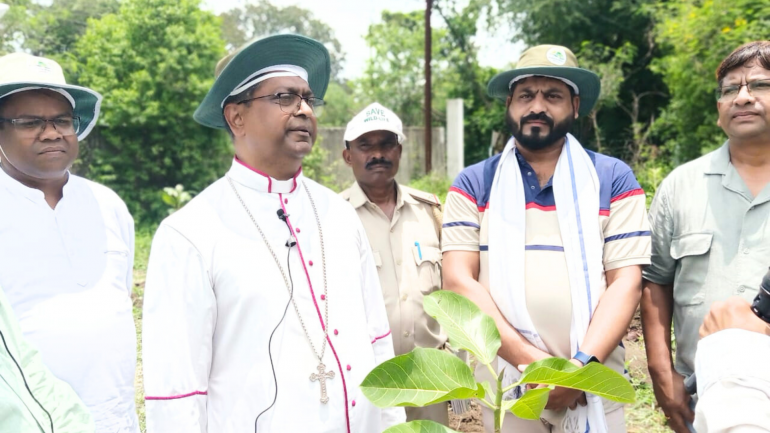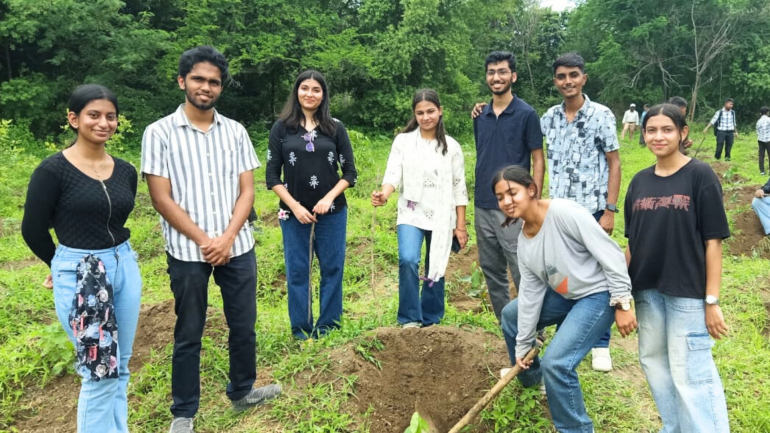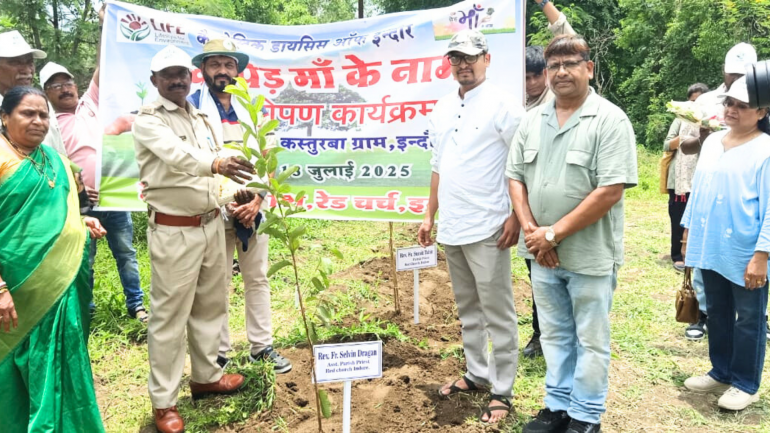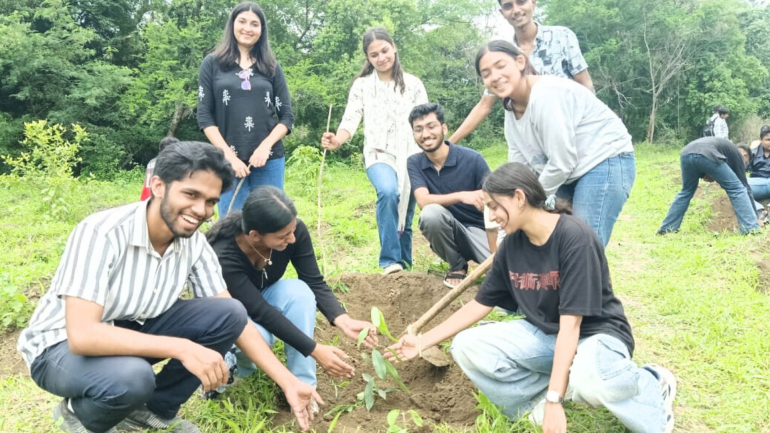Faith Takes Root in Indore’s Green Revolution
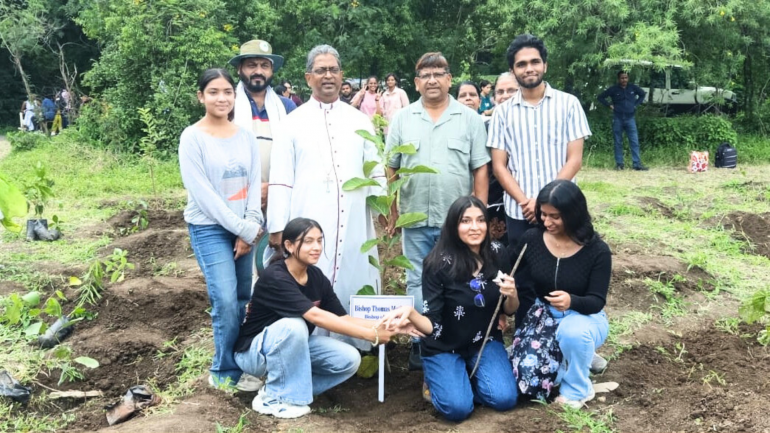
“By participating in this plantation drive, we are contributing to a greener Indore and fulfilling our responsibility towards God’s creation,” Bishop Thomas Mathew Kuttimackal declared on 13 July as he pressed his hands into the rich earth of Kasturba Gram, planting what would become one of 1,500 saplings that day.
His words echoed across the gathering of 150 Catholic faithful who had risen early to join the Indore Forest Department’s ambitious green mission.
The sight was both humble and profound, men, women, and children from parishes across Indore, their Sunday best exchanged for work clothes, carefully nurturing young mango, neem, and jamun trees into the soil. Each sapling represented more than environmental restoration. It embodied a living prayer, a tangible expression of faith translated into action for future generations.
This remarkable collaboration between the Catholic Diocese of Indore and the Forest Department speaks to something deeper than mere civic duty. It reflects how ordinary believers can become powerful stewards of creation when faith meets practical action. The participants were not environmental scientists or agricultural experts; they were teachers, shopkeepers, students, and retirees who understood that caring for God’s creation is as much a spiritual calling as attending Sunday mass.
The initiative is part of Prime Minister Narendra Modi’s “Ek Ped Maa Ke Naam” (A tree for Mother) campaign, which encourages every citizen to plant a tree. But for the Catholic community in Indore, this was not simply about responding to a government call. It represented a profound theological truth that many Christians worldwide are rediscovering: that environmental stewardship is integral to Gospel living.
Yohan Katara, the Sub-Divisional Officer of the Indore Forest Department, witnessed firsthand how religious conviction can amplify environmental efforts. His department’s comprehensive support system, providing quality saplings, technical guidance, fencing, caretakers, and ongoing maintenance, ensures that good intentions translate into lasting impact.
“We guide participants in proper planting techniques, fence plantation sites, deploy caretakers, and provide regular watering, weed control, and manure,” he explained. This partnership between faith communities and government agencies demonstrates how environmental challenges require both spiritual commitment and practical expertise.
The success of this model is evident in the numbers. The Forest Department has already planted 413,600 saplings toward their ambitious goal of 684,900 this year. But statistics tell only part of the story. The deeper narrative unfolds in the transformed hearts of participants who discover that caring for creation isn’t an additional burden but a natural extension of their faith journey.
For many Catholics, environmental activism might seem like a modern trend disconnected from traditional religious practice. Yet Sunday’s plantation drive demonstrated how ecological concern flows naturally from core Christian beliefs about human responsibility and divine stewardship.
When Bishop Thomas spoke of “fulfilling our responsibility towards God’s creation,” he was not introducing a new doctrine but reclaiming an ancient truth that Pope Francis powerfully articulated in his encyclical Laudato Si’. The Holy Father’s call to care for our “common home” reminds us that environmental degradation and social injustice are interconnected wounds that require healing through what he terms “integral ecology.”
The choice of native species mango, neem, and jamun reflects practical wisdom rooted in local knowledge. These trees do not simply survive in Madhya Pradesh’s climate; they thrive, providing food, medicine, and shade for generations. This thoughtful selection mirrors the kind of sustainable thinking that Pope Francis advocates in Laudato Si’, where he emphasizes that authentic environmental care must serve both the earth and the poor.
The mango trees will feed families, the neem will provide natural medicine, and all will offer respite from India’s intense heat, demonstrating how caring for creation naturally serves human dignity.
The impact extends far beyond the immediate planting. Children who participated will carry memories of working alongside their parents and parish community to heal the earth. They will remember Bishop Thomas’s dirt-stained hands and the shared sense of purpose that united young and old in common cause. These experiences shape environmental consciousness more effectively than any classroom lesson.
The Forest Department’s strategy of partnering with schools, religious institutions, and local residents recognizes that lasting environmental change requires broad community participation. “This is a people’s movement,” Katara emphasized, understanding that government agencies alone cannot achieve the scale of transformation needed.
The Catholic community’s enthusiastic response demonstrates how faith communities can become powerful allies in environmental restoration. Their existing networks, shared values, and commitment to service create ideal conditions for mobilizing collective action. When environmental care becomes a matter of faithful discipleship, as the late Pope Francis insisted, it transcends political divisions and ideological boundaries. This transformation of hearts reflects what Laudato Si’ calls “ecological conversion,” where believers recognize that love of God, love of neighbor, and love of creation are inseparable.
As Indore works toward becoming a greener, healthier city, the Catholic Diocese’s contribution represents more than 1,500 new trees. It embodies a vision of faith that engages the world’s urgent challenges with both spiritual depth and practical effectiveness. In an age when climate change and environmental degradation often generate more anxiety than action, the sight of believers planting trees with prayerful intentionality offers hope that transcends despair.
The saplings planted that Sunday morning will grow slowly, their roots deepening year by year, their branches reaching toward the sky. Like faith itself, their full impact will unfold over decades, providing shade and sustenance for generations yet to come. This patient work of restoration reflects the Holy Father’s insight that healing our common home requires both immediate action and long-term commitment. Perhaps the question for each of us is not whether we can save the entire planet, but whether we are willing to plant the seeds of hope in our own communities, trusting that small acts of love can grow into transformative change.





